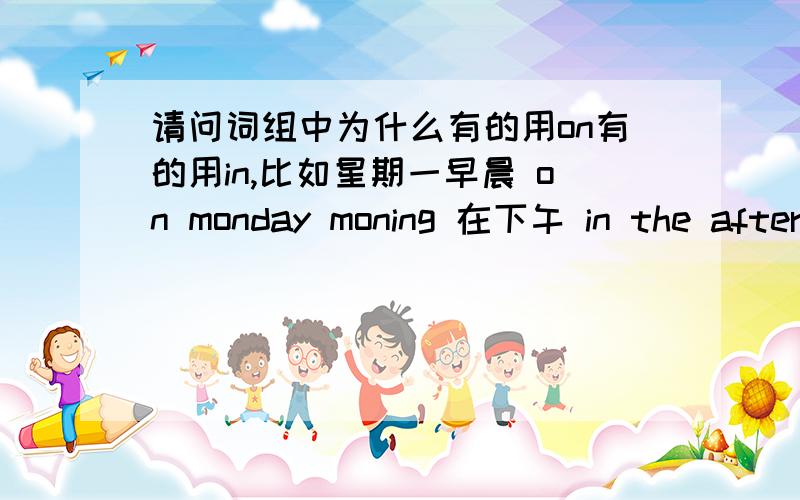请问词组中为什么有的用on有的用in,比如星期一早晨 on monday moning 在下午 in the afternoon
来源:学生作业帮助网 编辑:作业帮 时间:2024/11/27 13:10:16

请问词组中为什么有的用on有的用in,比如星期一早晨 on monday moning 在下午 in the afternoon
请问词组中为什么有的用on有的用in,比如星期一早晨 on monday moning 在下午 in the afternoon
请问词组中为什么有的用on有的用in,比如星期一早晨 on monday moning 在下午 in the afternoon
你可以形象的理解一下.on是在……上,刚好在这个时间点上.in是在……之内,意思是在这一段时间之内.用你文中的词组举例,on monday moning ,正在周一的早晨这个时点上.通常描述计划,约定时间的时候,用ON.而描述事情的时候,在某一天的某个早晨这一段时间内发生了一件事情,用in.
另外还有一些习惯用法需要记忆了,例如楼上说的AT NIGHT.
固定的日期用on,在……上面用on
在……里面用in
以……用in
习惯搭配中就只能入乡随俗了:
in the morning
in the afternoon
at night
在某一天前用介词on
在星期前用介词on
在上午下午傍晚用介词in
在中午 或 在午夜 用介词at
表示时间的介词
1. at, in 和on是用于表示时间的介词,表示具体的时刻可以用at。
We got used to getting up at six. 我们习惯于6点起床。
I’ll meet you at a quarter to eight. 咱么7点45分见。
2. 一天的各个时间最常见的词组有:in the morning, in the a...
全部展开
表示时间的介词
1. at, in 和on是用于表示时间的介词,表示具体的时刻可以用at。
We got used to getting up at six. 我们习惯于6点起床。
I’ll meet you at a quarter to eight. 咱么7点45分见。
2. 一天的各个时间最常见的词组有:in the morning, in the afternoon, in the evening, at daybreak, at sunrise, at noon, at night, at midnight等。
It always takes me ages to wake up in the morning. 每天早晨我都需要花好长时间才能醒过来。
three o’clock in the morning. 凌晨三点钟。
I work best at night. 我在晚上工作效率高。
3. 如果专指某一天上午、下午等,或要对这天上午或下午加以描述,就用on而不用in。
See you on Monday morning. 星期一早上见。
On a cold afternoon in January, I met her in the street. 在1月的一个寒冷的下午,我在街上遇到了她。
On that particular evening, there was a strange excitement in the air. 在那个特别的晚上,空气中都弥漫着兴奋。
I don’t like see people on the nights when I’ve been working late.当晚上工作很晚的时候,我不愿意见别人。
4. 谈到具体的某一天或特殊场合,用on。
Come back on Tuesday. 星期二回来。
On a summer day, in the month of May, he was born. 在5月的一个夏日,他出生了。
We are going to give him a surprise party on his birthday. 在他生日的时候,我们准备给他开一个惊喜晚会。
Granny’s coming to lunch on Christmas Day. 奶奶圣诞节来吃午饭。
5. 泛指圣诞节、新年、复活节时,都用at。
Are you going away on Easter? 复活节你们外出吗?
Children feel happy at Christmas. 孩子们过圣诞节非常高兴。
6. 谈到较长的时间,如星期、月、季、年、世纪等时,用in。
It happened in Easter week. 事件发生在复活节的那一周。
What month were you born in? 你是那个月出生的?
We usually go to the beach in summer. 我们通常是夏季去海滩。
I went to Dalian in 1997. 我1997年去了大连。
In the 21st century, computer science will develop greatly. 在21世纪,计算机科学将会得到大发展。
收起